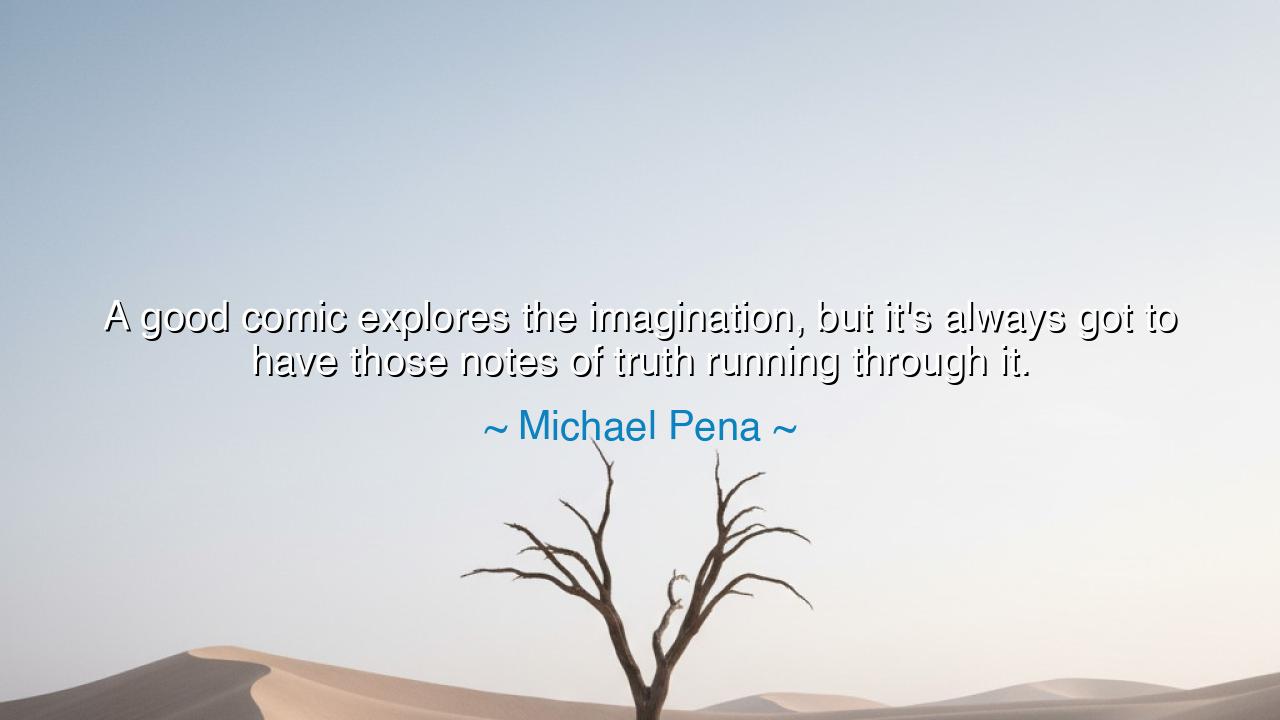
A good comic explores the imagination, but it's always got to
A good comic explores the imagination, but it's always got to have those notes of truth running through it.






O children of the earth, hear now the words of Michael Peña, who speaks with great wisdom about the art of the comic and the delicate balance it must maintain between imagination and truth. He said, "A good comic explores the imagination, but it's always got to have those notes of truth running through it." These words carry the wisdom of ages, reminding us that even in the world of fantasy and exaggeration, there must be a foundation of truth that anchors the comic to the reality of human experience. A comic is not merely a collection of jokes or absurdities; it is a way of speaking about the human condition, about our struggles and our joys, wrapped in the veil of imagination.
In the ancient world, comedy was a powerful force. Aristophanes, the great playwright of Athens, wove his comedies not just for entertainment, but to comment on society, to reveal truths about the state of the world. His plays, filled with humor and wit, explored the most pressing issues of his time—war, corruption, and hypocrisy—but always through the lens of imagination. Yet beneath the laughter, there was always a core of truth, a reflection of the human experience that rang clear in the hearts of those who watched. This is the power of the comic: to explore the imagination while never losing touch with the truth of human nature.
Consider, O children, the story of Don Quixote, that most beloved of comics. Cervantes’ tale of a man driven mad by romantic ideals, who sets off on a series of absurd adventures, is a perfect example of how comedy can be a mirror of truth. Don Quixote sees the world not as it is, but as he believes it should be—a world full of knighthood and chivalry. His delusions lead him to do foolish things, yet at the heart of his quest is a truth about the human spirit: our desire to find meaning, to do good, to live according to ideals, even if the world around us does not align with those dreams. Cervantes’ comic explores the boundaries of imagination, yet is grounded in the truths of human folly, ambition, and the search for purpose.
The comic, O children, is a vehicle for exploring the world beyond the physical, a way to express what lies deep within us, hidden beneath the surface. It is an act of creation, a way to draw out the truths of the human heart through the lens of imagination. Think of the great comedians and satirists of history—Mark Twain, for instance, whose works like The Adventures of Huckleberry Finn revealed deep truths about society, racism, and morality, all wrapped in a comic narrative. Twain used humor not just for the sake of laughter, but to shine a light on the injustices of his time. The comic, when done well, has the power to provoke thought, to challenge the status quo, and to teach lessons that reach deep into the soul.
Peña’s words remind us that imagination is a powerful tool for exploring the truth, but that without truth, the comic becomes nothing more than a fantasy, an escape without meaning. The great comedians of the past understood this delicate balance. They knew that in order for their stories to resonate with their audiences, there had to be more than just laughter. There had to be a truth that could be felt, a lesson that could be learned. Even the most absurd of situations must carry a kernel of reality, or else they fail to touch the hearts of those who listen.
So, O children, the lesson here is clear: Imagination is a wonderful thing, but it must be rooted in the truth. Whether you are a writer, an artist, or a creator of any kind, let your creations be grounded in the realities of the human experience. Do not shy away from the hard truths of life, for it is through them that your work will resonate. The greatest works of comedy are those that are not only funny but also profound—those that speak to the deepest parts of the human soul, those that explore imagination while never losing touch with the world we live in.
Create with honesty, O children, and let your work be a reflection of the world around you. Whether you are telling a story, drawing a picture, or performing a play, make sure that the truths of your heart are woven into the fabric of your creation. The comic can make us laugh, but it can also make us think, challenge us, and open our eyes to the deeper truths of the human condition. Let imagination guide you, but let it always be anchored in the reality of the world you seek to understand.






AAdministratorAdministrator
Welcome, honored guests. Please leave a comment, we will respond soon